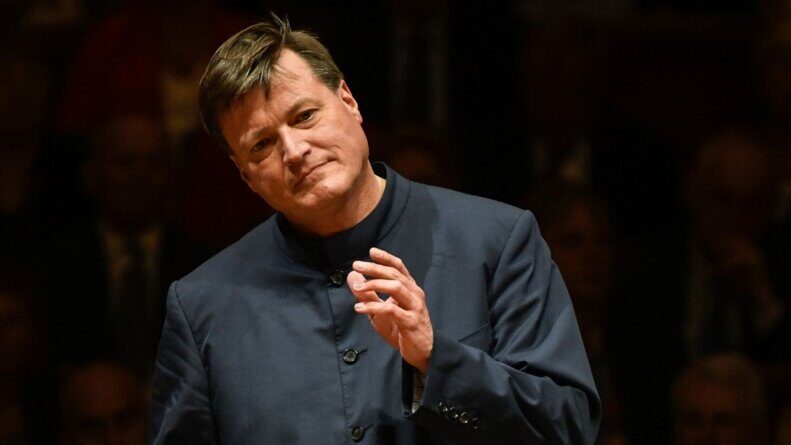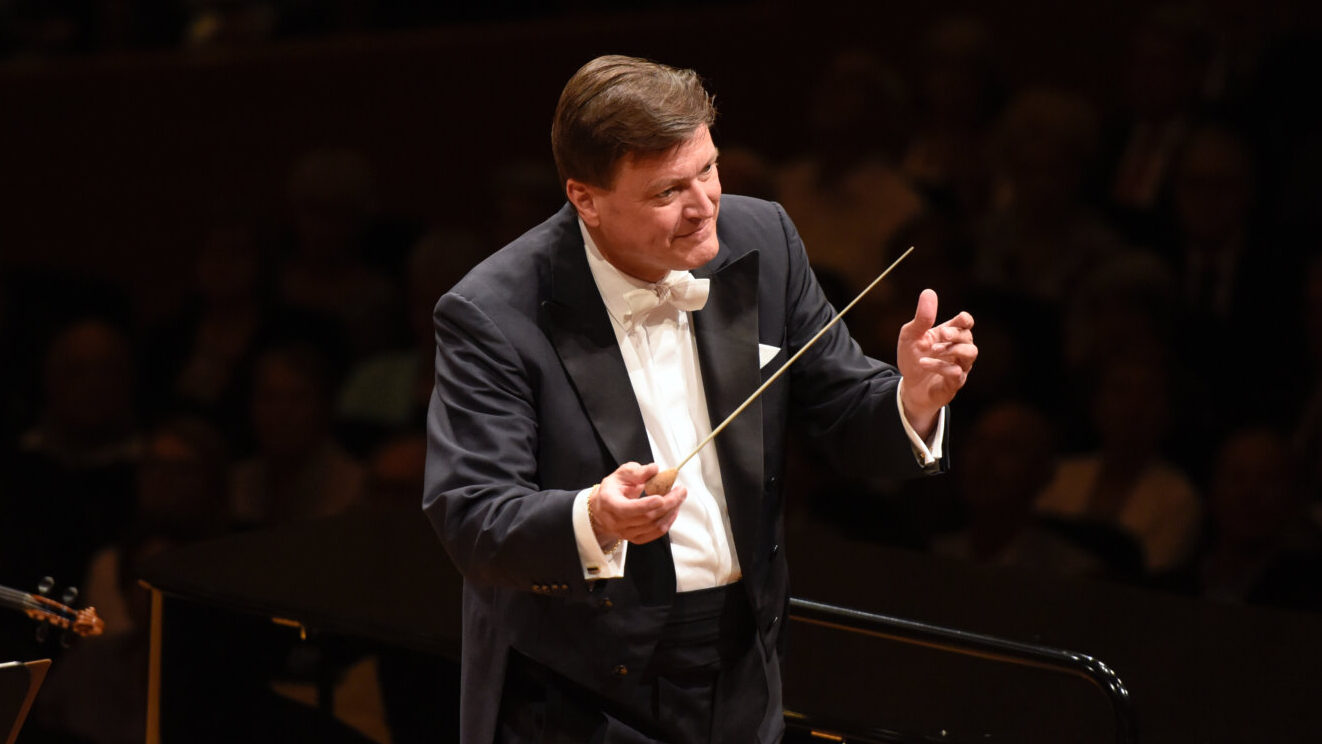On May 26, Christian Thielemann conducted the Dresdner Staatskapelle at Müpa, in Budapest. When an important conductor performs with his orchestra, one can always feel the many years of collaboration, the special connection between the conductor and his musicians.
It is a kind of soft power. It would be difficult to say exactly what is the added value to culture that the thoroughness, the common immersion in the works being performed contribute. But we feel it: culture is like this. It creates and preserves traditions. Often it preserves a tradition by changing it.
Thielemann and the male members of the orchestra wore tailcoats; the women wore evening dress or black pants suits. They played Mendelssohn and Zemlinsky. I could have imagined the whole event, lock stock and barrel, say, in the nineteen sixties, on the stage of the Academy of Music, around the time I started attending concerts. And that sent a special message.
When I think of Thielemann, I’m reminded of everything that classical Germanism meant in my youth, the Germanism of the Bildungsbürgertum. It meant Goethe and Thomas Mann, Beethoven and Schubert, Schumann, and of course, Mendelssohn.
Nowadays, it is not fashionable in Germany to be conservative when it comes to the arts. The huge storm sparked twenty years ago by the famous writer and playwright Botho Strauß in an essay on his conservatism is still reverberating today. Naturally, this was not the primitive attitude that uncultivated Hungarian rock musicians or politicians, who consider a pork-slaughtering sausage festival a cultural activity, call conservatism. It was about what the culture of the German bourgeoisie meant for centuries, which did not disappear even after the horrid era of Nazism, indeed, which helped resurrect Germany from its ruins.
The fact that someone loves this culture, which at its birth was anything but conservative, does not mean that one cannot at the same time love the current avant-garde, the great moderns of the last century in music, such as Cage or Ligeti, or one’s contemporaries. One of the most attractive features of European culture is that it is not exclusive but inclusive. In a present-day symphony orchestra we find both Asian and American instruments, but the symphony orchestra itself is a true European invention, born of the age of world trade.

This is why it is so alarming and repulsive to me how a fashion originating at some US universities is poisoning our European culture. Don’t misunderstand me. I’m a great supporter of the US, and I consider its mere existence to be one of the guarantees of universal human freedom. But we owe it not only the world-shattering statements of the Declaration of Independence, not only Microsoft, Google, Ford, and Tesla, but also that which is referred to today as woke or cancel culture or perhaps “cultural appropriation,” and at times identity politics.
The so-called progressive cultural fashions that have penetrated Europe in recent years are, of course, only fads and rarely result in political power interfering in cultural processes by means completely foreign to its own culture. We are intimately familiar with this type of political intervention here in Hungary, but what I’m writing about is not a Hungarian phenomenon. Below I cite several stories from the last decade. The news of these rarely reached us, as Hungarian provincialism also operates in the selection of cultural news. But it doesn’t hurt to know about them. At the end of the article, I return to why Thielemann brought all this to mind.
Blackface
The so-called blackface has become taboo. The taboo, like blackfacing, originated in the US, where in the 19th century, white musical comedians who entertained audiences in so-called minstrel shows often painted their faces black and mocked blacks musicians, at times with the participation of Negro musicians — somewhat similar to our gypsies cracking gypsy jokes. This black painting was called blackfacing, and recently the emerging and rapidly spreading taboo with respect to it has also spread to the opera stages.
In 2019 in Baden-Baden, in Verdi’s Otello, directed by Robert Wilson, Othello was played by a white singer without face painting.
Wilson is a great director, and naturally, there can be genuine artistic considerations for such a decision. But at a time of protests against blackfacing, it’s hard not to think that behind the decision was simply the desire to avoid scandal. In short, fear.
In 2021, Bright Sheng, a composition teacher at the University of Michigan, advertised a course on Othello/Otello to show various adaptations to his students. At the first lecture of the course, he screened the famous film from 1965, in which Lawrence Olivier played the title role painted black, as was entirely customary at the time. In an outraged letter, students in the course demanded that the dean of the faculty fire their teacher, saying that the blackface violated their sensitivity.
What does it mean from the point of view of the work that Othello is not black? What is lost? Lost is all the tension caused by the presence of an outsider who came from elsewhere, became successful, and now justifies Iago’s jealousy in an almost visceral way. After all, does it make sense to play Richard III without a hump?
Or henceforth can only black singers sing the title role in Othello?
Can only dwarves sing the title role of Zemlinsky’s opera, The Dwarf?
Can only white actors play Hamlet in China or Nigeria?
Can an Italian singer sing the title role of Madama Butterfly, written in Italian?
Isn’t the theater (and the opera) about a person playing someone else?
Isn’t this very aspect of the Othello story that is so deeply humane? Isn’t it precisely about the foreigner being just as talented, passionate, jealous, etc. as we are?
There’s an obverse to the story, about the same thing.
It was also in 2019 that a performance of Aeschylus’ Suppliants at the Sorbonne in Paris was blocked because, in accordance with ancient Greek tradition, and possibly also historical fidelity, in the performance, the Egyptians wore darker face masks than the Greeks.

We had a similarly motivated scandal in the case of Porgy and Bess here in Hungary. The story is more complicated than the ones mentioned above in that in this case the owners of the copyright prohibited the piece from being performed by non-black singers. From a copyright point of view, they have the right to do so despite the fact that Gershwin, the composer, made no such a stipulation (only one of the lyricists of the work, his younger brother, did so decades later), and that their stipulation showed complete ignorance of the circumstances and of the operatic genre. I watched Porgy on one occasion with an all-black troupe, where the point was not how good the singer was, but whether his skin was the right color. I wish such solid boredom to anyone.
„Cultural appropriation”
In 2017, the Empire Theater (in London’s Hackney) canceled the production by the Music Theater Wales of Péter Eötvös’s opera The Golden Dragon on the grounds that the racial diversity of the cast was not adequate. The opera takes place in a Chinese restaurant, but the singers in the Music Theater Wales production were not Asian.
In 2018, the performance of Robert Lepage’s production of SLAV was unexpectedly canceled by the Montreal International Jazz Festival because it provoked intense criticism. The lead role was played by a white actress, most of the actors were also white, and they sang songs composed by black slaves.
Lepage then said, “To me, what is most appalling is the intolerant discourse heard both on the street and in some media. Everything that led to this cancellation is a direct blow to artistic freedom.” As he said, the principle of theater is that one pretends to be someone else.
“Stepping into the shoes of another person to try to understand them, and in the process, perhaps understand ourselves, better,” he said. “This ancient ritual requires that we borrow, for the duration of a performance, someone else’s look, voice, accent and at times even gender… But when we are no longer allowed to step into someone else’s shoes, when it is forbidden to identify with someone else, theatre is denied its very nature, it is prevented from performing its primary function and is thus rendered meaningless.”
The fiends of identity politics would obviously ban both the Noh and the Kabuki, and they probably weren’t told that female roles at the Globe Theater and in the ancient Greek theater were all played by men. Nor that, par contre, in the early period of Kabuki, in the 16th century, there was an entirely female Kabuki troupe in which male roles were also played by women. Totally theatrical.
The poor Japanese actresses were clearly unfamiliar with the concept of cultural appropriation.
Jewish composers, Nazi composers, bourgeois composers, white composers
In 2021, Hannah Schmidt published a long article in the ZEIT stating that the canon of classical music is essentially racist and patriarchal. The article quotes the American musicologist Philip Ewell, who said: “We have to realize that the canon was not created by God, it is a human construction… All this was written and defined by white men, thus capturing the power of interpretation (Deutungsmacht). Their definitions are considered the aesthetic standard of music and also of higher value” [translated from German].
He has “no problem with Beethoven,” Ewell says. He has a problem only with what happened after Beethoven’s death, that his work and person were merged and are still identical with the concept of genius, and that it deeply defines Western culture. He has no problem. We’ve heard that before. This is one step away from making the repertoire disappear. Nazis and communists alike removed artists from the repertoire, with the power of sovereignty. And especially the former, often removed them from life as well.
Today, however, compiling a concert program is sometimes reminiscent of an etiquette class. For example, even the works of the great German composer Pfitzer that he wrote before he became a Nazi were not played for a long tie after the war. It was at the same time, after World War II, that the world of music soon forgot the entire series of great German and Austrian artists of the first half of the last century, who were persecuted by the Nazis (Ernst Krenek), killed by them (Viktor Ullmann), or hounded to death (Franz Schreker). In this way, it is possible to eventually disremember the entire history of music.
The Hungarian example of the work of the communists in this area was László Lajtha, who was treated as a folk music researcher during the decades of socialism, and the Hungarian audience started to become acquainted with his works only in the 1990s. But today’s left-wing musicologists — what an oxymoron! — have no desire to rediscover the works of murdered or persecuted Jews, much less of nazified composers.
And this is where we get back to Thielemann. From 2024 onward, when his contract expires, Thieleman will no longer have his orchestra. Saxon Culture Minister Barbara Klepsch (a CDU politician, but that is neither here nor there) announced a year ago that they do not expect to see Thielemann in Dresden in the future. In this respect, the Minister said:
“The opera of the future will be different from today’s; contemporary interpretations are needed. New target groups need to be reached, those who have not yet attended opera, concerts, or ballet. Digital opportunities must also be exploited. These aspects will also be considered in determining the future of the institution.”
The conductor, who represents a certain value, a tradition in an internationally recognized way, who, if asked, would openly avow his political and musical conservatism, had to be kicked out of Dresden because the political expectation was the those to attend classical music concerts now should be the ones who haven’t so far. It doesn’t make much sense, but it fits perfectly with the stories I’ve listed above. In the eyes of those guiding artistic life in Europe, the much-mentioned diversity seems to accommodate the preservation of traditions less and less.
Mendelssohn’s family was Jewish and baptized; his grandfather was a famous Jewish philosopher, and his father a large-scale businessman. All this didn’t save the family from having to flee Hamburg, which is how they ended up in Berlin, where the young Mendelssohn became the student of one of Goethe’s best friends, Zelter, so that he would then become the rediscoverer of Bach, the great Christian composer of St Matthew Passion.
Zemlinsky was also of Jewish descent. He was Austrian. Growing up in the happy, liberal world of the Monarchy, he worked in Vienna, Prague, and Berlin — from where he had to flee, back to Vienna, and then to New York after the Anschluss.
The great conductor, representing German conservatism, chose the works of two Jewish refugees of German culture side by side for this concert of his orchestra. I don’t know how others see it, but for me this is a message, a formal and beautiful one, aimed at all who find that culture can be sliced along national, political, and God forbid, racial lines. To me, this message says that culture is first and foremost identical to itself.
It is the only identity politics I can sympathize with.
Translated by Gabriel Lányi











